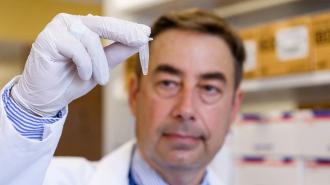Based on preliminary research, a new blood test for anxiety may be able to help doctors diagnose patients and find effective treatments for them. But some experts believe it needs to be independently confirmed by further research.
Anxiety 101: While anyone occasionally experiences worry or dread due to an upcoming event, such as an important test, people with anxiety disorders experience those feelings pervasively and often without any specific threat looming.
These feelings can get more intense over time and become all-consuming, interfering with the person’s daily life — and potentially increasing their risk of physical health problems, such as heart disease and stroke.
The challenge: Medications can help alleviate anxiety, but because it’s hard to know exactly what’s happening chemically to cause these feelings, finding the right med can take a lot of trial and error. During that process, a patient might try meds that make them feel worse.
“Having something objective like this … is very powerful in helping people.”
Alexander Niculescu
Before doctors can even begin to recommend treatments, though, they need to know a person has an anxiety disorder, and many people avoid talking about their symptoms with a doctor.
“There are people who have anxiety, and it is not properly diagnosed, then they have panic attacks, but think they’re having a heart attack and [end] up in the ER with all sorts of physical symptoms,” said Alexander Niculescu, a professor of psychiatry at Indiana University (IU).
The idea: Niculescu has now led the development of a blood test for anxiety that could help doctors identify patients with anxiety disorders and more quickly find effective treatment for them. The research has been published in Molecular Psychiatry.
“[H]aving something objective like this where we can know what someone’s current state is as well as their future risk and what treatment options match their profile is very powerful in helping people,” said Niculescu.
How it works: Our genes tell our cells how to make certain proteins, but because we don’t need every cell to be making every protein at all times, sometimes genes are on, or “expressed,” and sometimes they aren’t.
For their paper, the IU team examined the blood of people with anxiety disorders when they were in high- and low-anxiety states. This allowed them to identify molecules indicating that certain genes were expressed more or less during periods of high anxiety.
“This is something that could be a panel test as part of a patient’s regular wellness visits.”
Alexander Niculescu
Using other studies on anxiety, they prioritized their list of intriguing genes based on which were likely to be the best biological indicators, or “biomarkers,” of anxiety. They then tested their biomarkers in psychiatric patients, who also completed surveys of their anxiety states.
The researchers found that the blood tests did better than chance at predicting patients’ current anxiety levels and identifying which patients would see their anxiety get worse (based on future hospitalizations due primarily to anxiety).
The researchers also identified available anti-anxiety drugs that act on their biomarkers — that information could help doctors decide which medications to recommend a patient try first.
First steps: The blood test for anxiety cannot diagnose the disorders, and it’s not clear whether prescribing medications based on it is actually more effective than the current approach — more research is needed to figure that out.
“Whenever you see a finding like this, which is interesting, but clearly preliminary, what you want is to see it confirmed, not just by the original researchers, but by other groups as well,” Paul S. Appelbaum, a professor of psychiatry, medicine, and law at Columbia University, told Verywell Health.
However, looking at these biomarkers could help doctors identify and treat people with anxiety, and Niculescu has already founded a startup, MindX Sciences, that can test patients’ blood samples for anxiety biomarkers at the request of their doctors.

Because the IU team’s blood test for anxiety is still considered experimental, it likely won’t be covered by insurance, but that could change if future studies show that it can improve how doctors diagnose and treat anxiety disorders.
“This is something that could be a panel test as part of a patient’s regular wellness visits to evaluate their mental health over time and prevent any future distress,” Niculescu said. “Prevention is better in the long run, so our goal is to be able to provide a comprehensive report for patients and their physicians using simply one tube of blood.”
We’d love to hear from you! If you have a comment about this article or if you have a tip for a future Freethink story, please email us at [email protected].






